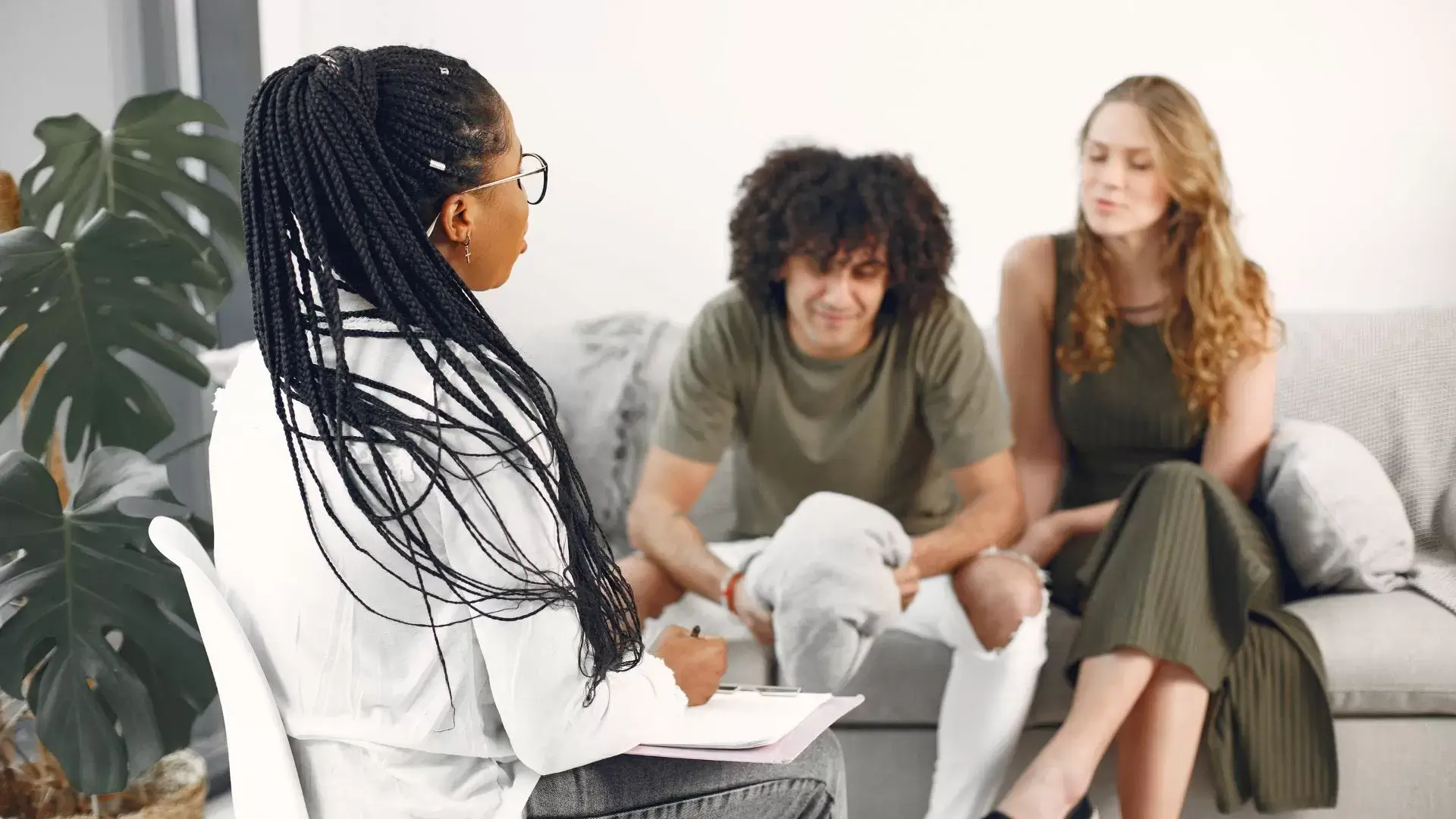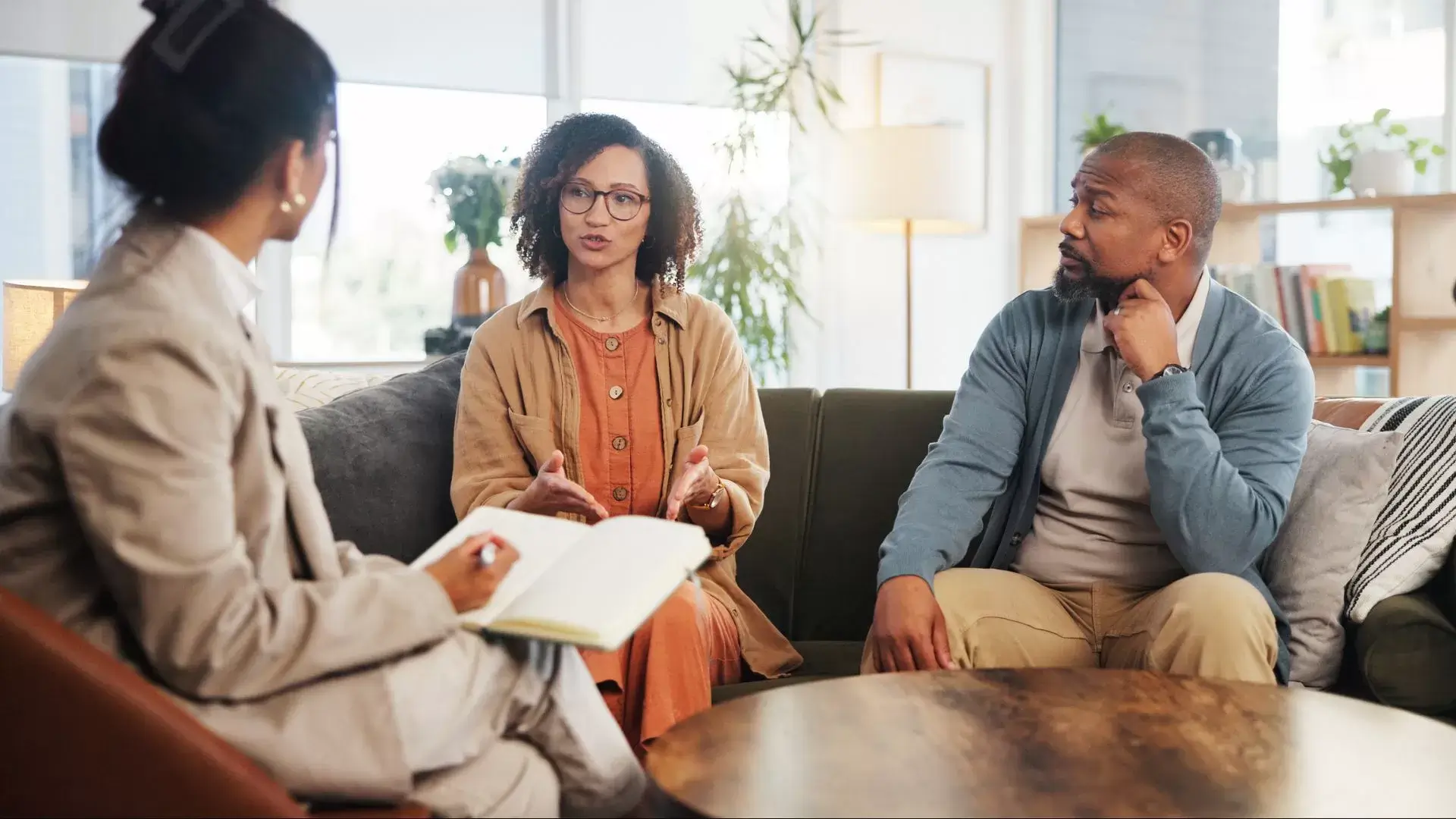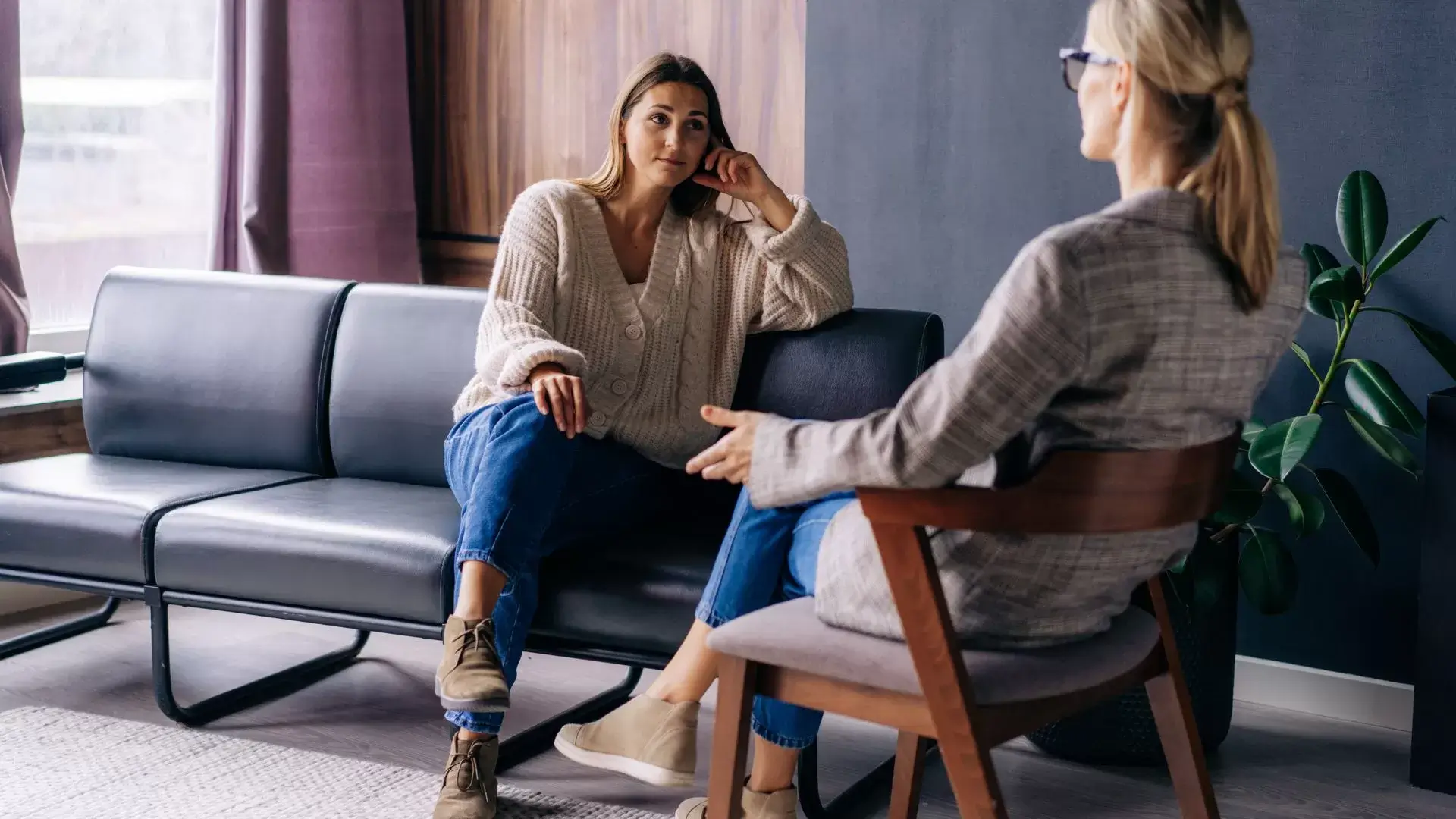Couples Counseling Psychotherapy
Couples counseling psychotherapy offers us a safe space to explore our relationship struggles and deepen our emotional bonds. It helps us enhance communication, resolve conflicts, and build trust, providing tools to manage stress and strengthen our connection. Whether we’re dealing with trust issues, intimacy, or maneuvering the complexities of blended families, skilled therapists guide us through these challenges.
By recognizing our unique dynamics, we can foster a healthier partnership built on empathy and understanding. Together, we can rediscover what brought us together and create a path forward, revealing more insights that can further enrich our journey together.

About Our Psychotherapy Counseling Services
At Psychotherapy Counsellor, we recognize that maneuvering through relationship challenges can be tough, and we’re here to offer compassionate support through our specialized psychotherapy counseling services. Our couples counseling aims to foster deeper emotional connections and enhance communication skills, helping partners navigate conflicts with greater ease.
We believe that relationship therapy provides a safe space for exploring feelings and addressing unresolved issues. We focus on conflict resolution techniques that empower you to express your needs while listening to your partner. This mutual understanding is essential for rebuilding trust and promoting emotional healing.
Our approach emphasizes the importance of emotional support, guiding you towards healthier relationships where both partners feel valued and understood. We encourage relationship growth by equipping you with practical tools to strengthen your bond, such as effective communication strategies and trust-building exercises.
Through our dedicated sessions, we aim to create an environment where you can openly discuss your thoughts and feelings, fostering a deeper emotional connection. Together, we can work towards overcoming obstacles and cultivating a loving, supportive partnership that thrives on mutual respect and understanding. Let’s initiate this journey of healing and growth together.
Introduction to Couples Counseling Therapy
Understanding the dynamics of couples counseling therapy can be the first step toward healing and strengthening your relationship. Many of us face relationship issues that can feel overwhelming, but seeking couples therapy offers a safe space to explore these challenges. Whether we’re addressing trust issues, enhancing emotional intimacy, or improving effective communication, marriage counseling provides the tools we need.
In couples counseling services, we learn conflict resolution techniques that help us tackle disagreements constructively, fostering a healthier emotional connection. This process isn’t just about fixing problems; it’s about relationship improvement and rediscovering what brought us together in the first place.
Through emotional connection therapy, we examine our feelings and learn to express them openly, which can be transformative. We can develop a deeper understanding of our partner’s needs and perspectives, promoting empathy and compassion.
The Importance of Couples Therapy for Relationship Growth
Couples therapy plays an essential role in our relationship growth, offering us the opportunity to navigate challenges together and strengthen our bond. Through couples therapy sessions, we can explore our relationship dynamics, gaining valuable insights into our interactions and patterns. It’s a safe space to address communication barriers that often hinder our emotional resilience.
By engaging in this process, we not only work on conflict management but also focus on intimacy enhancement. We learn effective relationship tools that help us reconnect, fostering deeper emotional growth. This journey of relationship healing encourages us to understand each other’s perspectives, leading to a more compassionate partnership.
With the guidance of a trained therapist, we can tackle our struggles head-on, transforming conflicts into opportunities for connection. The support we receive helps us build a stronger foundation, allowing us to flourish as a couple. Ultimately, couples therapy isn’t just about solving problems; it’s about enriching our relationship and nurturing the love we share. By committing to this process together, we pave the way for a healthier, more fulfilling future.
Common Relationship Issues Addressed in Couples Counseling
What common relationship issues can we tackle in couples counseling, and how can addressing them lead to a healthier partnership? We often encounter challenges like relationship stress and couples conflict that can strain our connections. By focusing on intimacy building, we can enhance our emotional vulnerability, allowing us to share our true feelings and foster deeper relationship trust.
Managing expectations is another critical aspect. Sometimes, we might feel disconnected because our goals don’t align. In couples counseling, we can work together to establish shared goals that reflect our values and desires, which can reduce tension. Additionally, we can learn effective conflict prevention strategies to navigate disagreements more constructively.

Enhancing Communication Skills in Relationships
Improving our communication skills can be a transformative step toward building a stronger, more connected relationship. In our journey through relationship challenges, we’ve likely encountered moments where clear communication felt out of reach. That’s where psychotherapy counseling services can play an essential role, offering us tools to enhance our emotional well-being.
Through couples therapy benefits, we can learn effective techniques to express our thoughts and feelings constructively. By practicing active listening and using “I” statements, we can address partnership issues without escalating conflict. Relationship advice from professionals helps us understand the importance of timing and tone, which can greatly affect how our messages are received.
Managing relationship stress often begins with how we communicate. By prioritizing open dialogue, we create a safe space for each other, fostering trust and intimacy. Relational counseling can help us identify patterns that hinder effective communication and provide strategies to break those cycles. Ultimately, strengthening relationships requires ongoing effort and a commitment to improving our communication skills together. Let’s embrace this journey, knowing that every step we take brings us closer to the fulfilling partnership we desire.
Conflict Resolution Techniques for Couples
Maneuvering conflicts in a relationship can be challenging, but with the right techniques, we can turn disagreements into opportunities for growth and understanding. One effective approach is prioritizing couples problem-solving. This means addressing issues collaboratively rather than competitively. By actively listening to each other, we can foster emotional balance, which is crucial for healthy conflict resolution.
We should also implement specific conflict resolution techniques, such as using ‘I’ statements to express our feelings without placing blame. This can help reduce defensiveness and promote empathy. When discussing commitment issues or shared responsibilities, it’s essential to maintain focus on our relationship therapy goals, ensuring that both partners feel heard and valued.
Practicing relationship stress management can further enhance our couple dynamics. Setting aside dedicated time to discuss concerns and celebrate successes can improve marital satisfaction and strengthen our bond. Through these strategies, we can navigate conflicts more effectively, paving the way for relationship recovery. Remember, it’s not about winning arguments but about building a deeper understanding and connection with one another. By embracing these techniques, we’re taking meaningful steps toward a healthier, more fulfilling partnership.
Rebuilding Trust and Emotional Intimacy
Rebuilding trust and emotional intimacy is an important journey for couples looking to strengthen their bond after experiencing hurt or betrayal. We’ve all faced challenges that test our relationship compatibility, especially during infidelity recovery. It’s vital to approach this process with empathy, understanding, and a commitment to relational growth.
First, we need to acknowledge the emotional connection issues that arise from such experiences. Open communication is key in relationship trust building; we must share our feelings honestly while also listening to our partner’s perspective. This mutual understanding can help us start overcoming infidelity and heal together.
In marriage therapy, we can learn effective strategies for rebuilding intimacy. Engaging in activities that foster closeness, whether through shared hobbies or intimate conversations, allows us to reconnect on a deeper level. We should also set realistic expectations, recognizing that long-term relationships require ongoing effort.
As we navigate these couples challenges, let’s remember that rebuilding trust takes time and patience. By supporting each other and remaining committed to our journey, we can emerge stronger and more connected than ever before. Together, we can create a foundation for a healthier, more fulfilling relationship.
Understanding Relationship Dynamics and Patterns
Understanding the intricate dynamics and patterns in our relationships can help us uncover the underlying issues that often contribute to conflicts and misunderstandings. In couples counseling, we explore how our unique relationship dynamics shape our interactions and emotional responses. Recognizing these patterns allows us to improve our problem-solving skills and better navigate challenges together.
We might also discover how our different love languages influence our emotional connections. By understanding these nuances, we can foster deeper intimacy and appreciation for each other. Whether we’re seeking pre-marital counseling or engaging in marital therapy, it is crucial to address our relationship patterns and learn healthier ways to communicate.
For those in blended families, blended family counseling can be particularly beneficial. It helps us understand the complexities involved in merging different dynamics, promoting harmony among all family members. Relationship coaching offers additional support as we work toward marriage enrichment, enhancing our overall connection.
Strengthening Emotional Connection and Intimacy
As we explore our relationship patterns, we can also focus on strengthening our emotional connection and intimacy, which are essential components of a lasting partnership. At Psychotherapy Counsellors, we can begin this journey together. One effective way to enhance our emotional bond is through open communication. Sharing our thoughts and feelings fosters understanding and compassion, allowing us to feel more connected.
We can also engage in shared activities that bring joy, whether it’s cooking together, taking walks, or simply enjoying a quiet evening. These moments create lasting memories and deepen our intimacy. It’s important to practice active listening, demonstrating that we value each other’s perspectives and emotions.
If we find ourselves struggling, reaching out for professional help can be a valuable step. We can provide us with tools for relationship strengthening. Remember, building emotional connection and intimacy takes time and effort, but nurturing our bond will ultimately lead to a more fulfilling partnership. Let’s commit to this journey together, supporting each other every step of the way.
Pre-Marital Counseling: Preparing for a Strong Future Together
Pre-marital counseling can be an essential step in ensuring we’re well-prepared for the journey of marriage, helping us navigate potential challenges and strengthen our bond. This process allows us to explore our values, expectations, and communication styles, laying a solid foundation for our future together.
During these sessions, we can discuss important topics like finances, family planning, and conflict resolution. By addressing these areas, we’re not only enhancing our understanding of each other but also fostering a sense of teamwork. It’s a safe space for us to voice our concerns and aspirations, ensuring we’re on the same page before tying the knot.
Moreover, pre-marital counseling equips us with valuable tools to handle disagreements constructively. We’ll learn how to communicate effectively, listen actively, and empathize with one another’s perspectives. This proactive approach can help us avoid common pitfalls that couples face in marriage.
Ultimately, investing time in pre-marital counseling can empower us to build a resilient partnership. It’s about setting the stage for a fulfilling and lasting relationship, where we can grow together as individuals and as a couple. Together, we can commence on this beautiful journey with confidence and clarity.

Addressing Infidelity and Healing the Relationship
Even with a strong foundation built during pre-marital counseling, couples may still face the heart-wrenching challenge of infidelity, which can shake the very core of their relationship. When we encounter betrayal, it’s natural to feel a whirlwind of emotions—anger, sadness, and confusion. Acknowledging these feelings is the first step toward healing.
In therapy, we can create a safe space to explore the underlying issues that led to infidelity. It’s essential for both partners to express their feelings openly and honestly, while also practicing active listening. This mutual understanding can help us navigate the complexities of trust and vulnerability.
We must also focus on rebuilding the emotional connection that may have been lost. Together, we can establish new boundaries and set intentions for the future. It’s a gradual process, but healing is possible when we commit to understanding each other’s needs.
Managing Relationship Stress and Avoiding Burnout
Managing relationship stress is crucial for maintaining a healthy partnership, and recognizing the signs of burnout early can help us navigate through tough times together. We often find ourselves overwhelmed by daily pressures, which can strain our bond. It’s important to communicate openly about our feelings and to check in with one another regularly.
We should look for signs like irritability, withdrawal, or a lack of intimacy, as these may indicate we’re nearing our breaking point. When we sense stress building, it’s important to take a step back and assess what’s causing it. Are we overcommitting ourselves? Are we neglecting our individual needs?
To avoid burnout, we can create rituals that foster connection, like designated date nights or shared hobbies. Practicing gratitude and acknowledging each other’s efforts can also help us feel valued and appreciated.
The Role of Love Languages in Relationship Improvement
Understanding our love languages can greatly enhance the way we connect and communicate in our relationships, fostering deeper intimacy and mutual appreciation. When we identify our own love language and that of our partner, we can tailor our expressions of love to meet each other’s needs more effectively. This understanding helps us avoid misunderstandings and enhances our emotional connection.
For instance, if one of us values quality time while the other appreciates acts of service, we might find ourselves feeling unfulfilled or overlooked. By recognizing these differences, we can consciously choose to engage in behaviors that resonate with each other. Whether it’s planning a special date or lending a helping hand, these small gestures can make a significant impact.
Moreover, discussing our love languages together creates an open dialogue about our desires and expectations. It allows us to express our feelings without fear of judgment. Let’s remember that love languages are not rigid categories; they can evolve over time. By nurturing this understanding, we can cultivate a more supportive and loving environment where we both feel valued and cherished. Ultimately, embracing our love languages can pave the way for a stronger, more harmonious relationship.
Blended Family Counseling for Unique Challenges
Blended family counseling offers essential support for managing the unique challenges that arise when merging different family dynamics, helping us create a harmonious environment for everyone involved. When we come together as a blended family, we often face issues like loyalty conflicts, differing parenting styles, and adjusting to new roles. It’s normal to feel overwhelmed, and that’s where counseling can truly help.
In our sessions, we can explore the emotional needs of each family member, facilitating open conversations that allow everyone to express their feelings without judgment. This creates a safe space for us to navigate the complexities of our relationships. We’ll learn effective communication strategies and conflict resolution techniques, ensuring that everyone feels heard and valued.
Counseling also provides us with tools to establish new family traditions and foster connections between step-siblings, which can be vital for building a cohesive family unit. By addressing these unique challenges together, we can strengthen our bonds and create a supportive atmosphere where love and understanding thrive. Remember, it’s okay to seek help; together, we can turn challenges into opportunities for growth and connection.
Couples Therapy Benefits for Long-Term Relationship Success
Couples therapy offers a valuable opportunity for us to strengthen our relationship and build a solid foundation for long-term success. Engaging in therapy together helps us develop effective communication skills, allowing us to express our feelings and needs more openly. This understanding fosters a deeper emotional connection, making it easier for us to navigate challenges as a team.
Moreover, therapy encourages us to explore our individual perspectives and experiences. By recognizing our differences, we can learn to appreciate each other more fully, reducing feelings of resentment or frustration. It’s a safe space where we can address unresolved conflicts or patterns that may be hindering our growth.
Another significant benefit is the guidance we receive from a trained professional. They provide insights and strategies tailored to our unique situation, empowering us to adopt healthier behaviors and coping mechanisms. This proactive approach not only enhances our current relationship but also equips us with tools to tackle future obstacles.
Ultimately, couples therapy nurtures a culture of trust and respect between us, ensuring that our relationship can flourish. Investing in this journey together sets the stage for lasting love and companionship.
Reach Out for Professional Couples Counseling Services
Seeking professional couples counseling can be a crucial step toward enhancing our relationship and finding the support we need to navigate challenges together. It’s natural for us to face rough patches, but reaching out for help can be the turning point in our journey. A skilled therapist provides a safe space where we can openly express our thoughts and feelings without judgment.
When we decide to seek counseling, we’re committing to understanding each other better and improving our communication. The therapist can guide us in identifying patterns that may be causing friction and help us develop healthier ways to interact. They also equip us with tools to manage conflicts, ensuring we create a supportive environment for one another.
It’s important to remember that asking for help doesn’t mean we’ve failed; it means we’re willing to invest in our relationship. By choosing to work with a professional, we’re taking proactive steps toward a stronger partnership. So let’s not hesitate—reaching out for couples counseling can truly be a transformative experience that strengthens our bond and fosters a deeper understanding of one another. Together, we can navigate any challenges that come our way.
Frequently Asked Questions
How Long Does Couples Counseling Typically Last?
When we think about how long a process like this might last, it really can vary. Typically, we find that people engage for a few sessions to several months, depending on what’s going on. It’s important for us to focus on our unique needs and goals. We’ll often notice progress along the way, and that can guide us in determining how long we want to continue this journey together.
Are Sessions Confidential?
When it comes to confidentiality, we recognize how vital it is for our comfort and trust. Generally, sessions are confidential, meaning what we share stays between us and the therapist. However, it’s essential to highlight that there might be exceptions, like if someone’s safety is at risk. We should always feel free to ask our therapist about confidentiality to guarantee we feel secure and supported throughout the process.
Can Individuals Attend Sessions Without Their Partner?
We recognize that sometimes, we may want to explore personal feelings or issues on our own. Yes, individuals can attend sessions without their partner, and it’s completely normal to seek support independently. This can provide us with valuable insights and help us feel more empowered. It’s important to communicate openly with our partner about our decision, ensuring that both parties feel respected and understood throughout the process.
What Qualifications Do Couples Therapists Have?
When it comes to qualifications for therapists, we often find that they typically hold advanced degrees in psychology or social work. Many have specialized training in relationship dynamics and conflict resolution. It’s essential they’re licensed, as this guarantees they’ve met professional standards. We should also look for therapists with experience in the specific issues we’re facing. Ultimately, finding someone who resonates with us is key to effective support and growth.
How Much Does Couples Counseling Usually Cost?
When it comes to costs, we’ve found that the price of counseling can vary widely. Typically, sessions can range from $75 to $250 per hour, depending on factors like location and therapist experience. While it might seem like a significant investment, many of us find that the benefits to our well-being and relationships can far outweigh the costs. It’s important to reflect on what’s valuable to us as we seek support.


